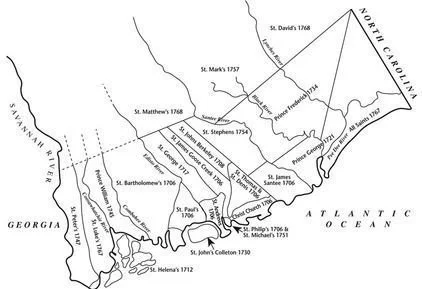Thank You, Mrs. Barnwell
When Beaufort was occupied by the Union Army in November 1861, residents of Beaufort and the surrounding islands evacuated so quickly that many left their dinners sitting on the table. Imagine the panic of these people as they hurriedly packed as many belongings as they could while the Union troops advanced on them. What to take? What to leave behind? Sarah Caroline Barnwell faced this dilemma.
But first - some history.
In the 1700s, South Carolina was divided into parishes. Many of them you've probably heard of such as Prince William Parish, home to the Old Sheldon Church ruins, and St. Helena's Parish, home to the much-loved St. Helena's Episcopal Church as well as the Chapel of Ease on St. Helena Island. There was St. Andrews Parish which you've driven through if you've been to Charleston, also St. Paul's, St. Michael's, St. Matthews.
The propensity for biblical names stems from the fact that in the 1700s the state church of South Carolina was the Church of England, or Anglican Church (although its prominence in southern society dwindled some in the post-colonial period). Parishes of the church existed throughout the state to serve as election districts and were responsible for community matters such as taking care of the poor, developing roads, and providing education. Registers were kept of parish goings on - births, marriages, deaths, etc.
So you can imagine that a Parish Register would be an extremely important and valuable record of the history of that community.
Once the Union troops got to Beaufort they packed up all the records they could find and sent them elsewhere; eventually, they were burned. Very, very little of Beaufort's pre-Civil War records survived the war. Certainly this wasn't the greatest tragedy of the War Between the States but it can be listed among the things that happened that just make your heart break at the thought of all that rich history gone. Just gone.
Enter Mrs. Barnwell.
Mrs. Sarah Caroline (Richardson) Barnwell was married to Captain Edward Barnwell who was, for many years, the warden of St. Helena's Parish. His job was varied but one of his tasks was to keep the Parish Register. Captain Barnwell died before the Civil War, but Mrs. Barnwell was still in possession of the Parish Register when the "Day of De Big Gun Shoot" sent everyone fleeing from Beaufort and the sea islands in advance of the Union Army.
She knew the importance of the register, but there was only so much she could take with her. I can only imagine the pain of this decision-making, especially in the panic and hurry of trying to get out of Beaufort. Fortunately for us, she decided that the Parish Register couldn't be left behind, so she packed it up with her other cherished possessions and took it with her. I wonder what precious family treasure she had to leave behind so that the register would fit in her trunk?
After the war, she eventually gave it to Robert Barnwell Rhett, editor of the Charleston Mercury newspaper and he eventually gave it to the Charleston Library Society.
And now....be still my heart.....the register has been digitally archived and you can read THE WHOLE THING online. If you apply a little imagination, it's actually riveting reading, and the dates are mind-boggling - 1700s Beaufortonians, long gone, coming alive in your mind through simple entries made about births and baptisms, marriages, and deaths by fever and dropsy. There are old Beaufort names; a whole mess of Barnwells, of course, but also Albergotti, Bull, Pinckney, and Fuller.
A description exists on the front page that includes this:
Done at Beaufort in the 25th year of the reign of His Majesty George II and is most humbly inscribed unto the Reverend: the minister, the church, wardens and Gentlemen of the Vestry and the other, the Gentlemen freeholders of the Said Parish, by their most humble and obliging servant, William Gough, St. George, 1752.
Can you picture Mr. Gough in 1752 (1752!!) in his breeches and buttoned coat, sitting at a wooden desk in St. Helena's Episcopal Church, the very building we know and love today, writing this down with no idea that people would someday be reading it on a computer via the internet?
Therefore, we must appreciate Mrs. Barnwell for her quick thinking, her attention to heritage, and her (perhaps) impulsive decision to include the St. Helena's Parish Register in the limited space in her trunk as the Yankees descended upon her home. With her actions she preserved a precious piece of Beaufort history that would have otherwise been lost. Her decision gave us one more opportunity to ponder our connection to these people who also loved Beaufort and called it home.
So thank you Mrs. Barnwell. What a gift you gave us.

